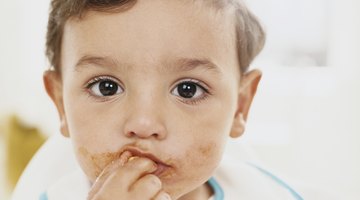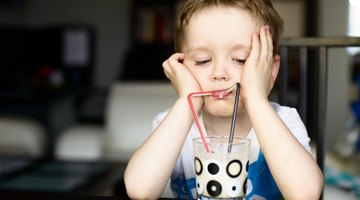Decrease in Appetite & Diarrhea in Toddlers
Diarrhea, characterized by frequent runny bowel movements, is often accompanied by a loss of appetite in conditions such as the stomach flu and celiac disease. If your toddler is eating less than usual and experiencing diarrhea, he can become dehydrated, so it important to understand what can cause these symptoms and how to treat them.
Causes
If your toddler is experiencing a decrease in appetite and diarrhea, she might have gastroenteritis. Also known as the stomach flu, gastroenteritis is caused by a bacterial or viral infection. A milk allergy also can cause your toddler to lose her appetite and have diarrhea, as can celiac disease, an immune system reaction to the protein in wheat, rye and barley. According to Babycenter, teething can cause your toddler to refuse food and experience diarrhea because of swallowing excess saliva production, which can cause loose stools.
Other Symptoms

Home Remedies for Toddler Diarrhea
Learn More
The conditions that can cause your toddler to experience diarrhea and a decrease in appetite are often accompanied by other symptoms. For example, if your toddler has the stomach flu, he also might have stomach pain and a fever. Vomiting and rashes can be other signs of a milk allergy, and a stomachache, poor growth and weight loss can be additional symptoms of celiac disease. If your toddler is drooling, you might notice irritability in addition to diarrhea and a decrease in appetite.
Testing
In many cases, such as with teething or the stomach flu, your toddler’s doctor will just need to examine and evaluate her to determine the cause of her diarrhea and loss of appetite. If her doctor suspects a milk allergy, you might need to remove dairy from her diet and slowly reintroduce it to see if the problems start again. If celiac disease is a possibility, your toddler’s doctor might perform a blood test.
Treatment

Foods for Toddlers With Diaper Rash
Learn More
There is no treatment for the stomach flu, but you can help your toddler through it by giving him plenty of fluids to prevent dehydration. Your toddler’s doctor might recommend that you offer an electrolyte solution to help your toddler replace fluids and minerals he loses through diarrhea. Symptoms of a milk allergy are handled by simply avoiding dairy products, while celiac disease is handled only by avoiding gluten products. You can offer your toddler relief from teething with a teething ring, over-the-counter pain relievers and cold foods like yogurt and applesauce.
Recommendations
Diarrhea typically passes in a few days, and Kids Health recommends that you call your toddler’s doctor if it lasts any longer or is accompanied by a fever over 102 degrees F. Offer your toddler anti-diarrheal medication only if her doctor recommends it.











